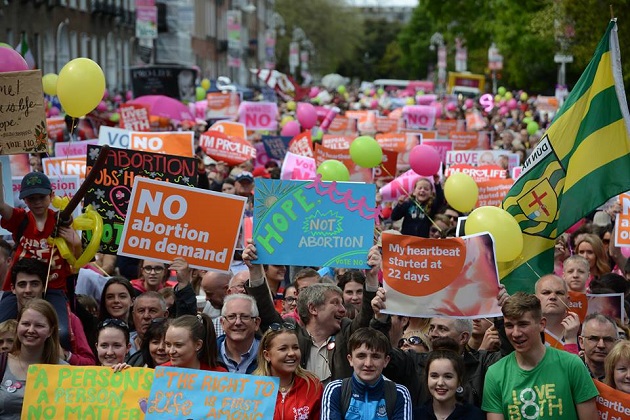Ireland decides about abortion
“Choice is important and to be cherished, but we also have an obligation to protect those who are powerless and unable to make choices that directly affect their futures”, the Evangelical Alliance Ireland says.
DUBLIN · 17 MAY 2018 · 17:31 CET

The future of Ireland's abortion law will be decided in a referendum on May 25th.
On March 9, 2018, the Thirty-sixth Amendment of the Constitution Bill 2018 was introduced to the Oireachtas (Ireland's Parliament), aiming to repeal the Eighth Amendment.
“After weeks and months of politicians debating the issue, now the people of Ireland get the chance to have their say”, Health Minister Simon Harris said after the date was announced.
THE 8TH AMENDMENT
Approved by 67% of Irish voters in 1983, the 8th Amendment of Ireland's constitution grants a mother and her unborn child an equal right to life.
It was later broadened in a 1992 referendum, allowing women to travel to another jurisdiction to have an abortion.
Right now, seeking or providing an abortion in Ireland is punishable by up to 14 years in prison.
FREE ABORTION WITHIN THE FIRST 12 WEEKS
If the current law is repealed, abortion will be accessible within the first 12 weeks of pregnancy.
Doctors have a legal obligation to discuss the woman’s options with her. She will have a three-day waiting period to think about it, and afterwards, those who choose to continue with the abortion will receive an abortion pill.
After 12 weeks, abortions will only be available if there is a risk to a woman’s life or serious harm to her health, and if the foetus will not survive outside the womb, or will die shortly after due to a fatal abnormality.
TIGHT CAMPAIGN
The Irish Times/MRBI poll published this week, found that 44% would vote to repeal the amendment (voting Yes), a decline of three points since the last poll in late April, with 32% opposed (No), an increase of four points.

Meanwhile, Google announced on May 9th that it would ban all advertising related to the Irish abortion referendum from its platforms.
“This decision is not about ‘concerns about the integrity of elections’. It is about concerns the No side will win. (…) Online was the only platform available to the No campaign to speak to voters directly. That platform is now being undermined, in order to prevent the public from hearing the message of one side”, Pro-Life Campaign, Save the 8th, and the Iona Institute said in a joint statement.
Thousands turned out in Dublin for a rally by the Love Both group, opposing the repeal of the Eighth Amendment.
“THE PROTECTION OF UNBORN IS A HUMAN RIGHTS ISSUE”
The Evangelical Alliance Ireland (EAI) released a statement concerning the referendum, which “is designed to be a principled and compassionate defence, on Human Rights grounds, of the right to life of the unborn child”.
The EAI has also published two books on the subject: ‘The Gospel & Human Rights’ and ‘Birth Equality’ , written by its Executive Director, Nick Park, who has spoken at over 30 rallies in the last three months.

“We are opposed to the imposition of religious dogma through State compulsion or legislation. However, the protection of unborn children is a Human Rights issue and should not be viewed as simply a matter of Church and State separation or of religion versus secularism”, the EAI says in its statement.
THE RIGHT TO LIFE
The EAI recognises that “women have been subjected to oppression and discrimination for generations, and that religious institutions have all too frequently been active and complicit in this process. That should provoke all religious leaders to profound reflection and repentance”.
“But we do not progress the cause of Human Rights by depriving others of the most basic Human Right of all: the right to life”, they add.
According to the EAI, “choice is important and to be cherished, but we also have an obligation to protect those who are powerless and unable to make choices that directly affect their futures”.
“RARE CASES”
The statement warns about those who “have wrongly suggested that the 8th Amendment primarily impacts upon rape victims or parents whose children suffer from gross and rare abnormalities”.
“In reality, history demonstrates that such cases are a tiny fraction of abortions that result once a nation legalises abortion”, it explains.
In fact, the EAI denounces that “it is notable that the current referendum proposals have refused to address these tragic and rare cases and have instead advocated abortion on demand for any reason”.
“We would strongly argue against any proposal to repeal the Eighth Amendment […] we believe it will become a model for other nations to treat all of their people, including those suffering from disabilities, as citizens possessing an equal right to life and an equal opportunity to contribute to the good of society”, the EAI concludes.
“REFERENDUM IS ABOUT TRUSTING POLITICIANS”
In an article published in the Irish Times newspaper on May 1, EAI Director Nick Park said that, “according to the World Bank’s maternal mortality ratios, Ireland currently has a healthcare system that is one of the safest in the world for pregnant women, with maternal mortality rates lower than those of either the United Kingdom or the United States”.
“Yet we are being sold a false narrative that our laws on pregnancy and abortion need to be updated to become more like these countries”, he pointed out.
Authorising the Oireachtas to legislate anything it chooses on the subject of abortion “will not just apply to the current minority government, but to every future government, including those which are struggling post-election to garner votes and need to form coalitions or sweet-talk a few Independent TDs into keeping them in power”, Park warned.
According to the EAI Director, “the imminent referendum is not about trusting women. Nor is it about trusting doctors. It is about trusting politicians”.
“It would be naive in the extreme to remove the most important human right of all – the right to life – from the Constitution and to put it in the hands of career politicians”, Park concluded.
Published in: Evangelical Focus - europe - Ireland decides about abortion
